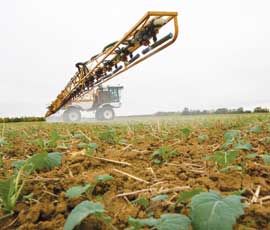New aphid control option for OSR this autumn

Oilseed rape growers now have an effective option to control late aphid infestations which are becoming increasingly resistant to pyrethroid sprays, following the approval of a key insecticide for this autumn.
Controlling autumn aphids is crucial, particularly the peach potato aphid (Myzus persicae), which spreads the yield sapping Turnip Yellow Virus. Infection typically results in yield losses of 0.5-0.75 t/ha in UK commercial crops.
However, there is increasing resistance which makes control more difficult. Syngenta OSR technical manager, Chris Charnock, points to early season reports issued by Rothamsted Research and the HGCA, which reveal that 96% of Myzus tested were resistant to pirimicarb and 94% resistant to pyrethroids – the mainstay of growers’ autumn insecticide strategies.
He advocated that where aphid populations build up later in the season, Plenum (pymetrozine) will complement current seed treatments to extend control of all aphid species through the autumn.
TuYV is spread by aphids feeding on an infected plant, and then moving onto an uninfected plant to continue feeding, so greater aphid activity in the crop results in faster and more widespread infection.
“Pymetrozine stops the feeding activity of all aphids feeding on treated plants within an hour,” he explains. “Although treated aphids may stay alive for up to 48 hours, any further feeding activity is stopped and the subsequent risk of virus spread prevented.”
Independent trials last last year demonstrated an 80% reduction in aphid numbers three days after treatment in late October. Virus trials at Brooms Barn have also shown up to 70% reduction in the number of plants infected by TuYV when treated with pymetrozine.
Mr Charnock advised autumn Plenum applications should be made as soon as myzus activity is seen in the crop, at 0.3 kg/ha when used alone, or 0.2kg when used in conjunction with a recommended methylated rapeseed oil.
The new approval now allows for the product to be used once in the autumn to counter the aphid threat, and again as a pre-flowering application in the spring for pollen beetle control.
Read more
Light leaf spot is key threat to OSR this autumn

